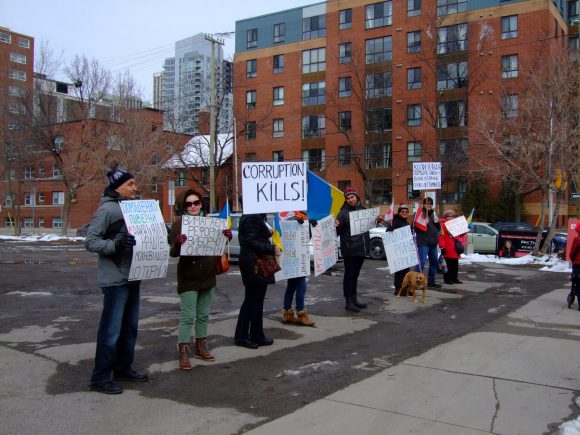Canada didn’t believe that Russia is a dangerous place to go back to
The Federal Court of Canada declined an application of Elena Musikhina, former professor at Irkutsk State Technical University, for leave and judicial review of her rejected refugee claim.
Elena Musikhina, together with her husband Mikhail Musikhin, entered Canada on December 24, 2015, using visitor visas under the pretext of coming to see their daughter Olesia Sunatori who had immigrated to the country in October 2012 on the basis of her marriage with a Canadian citizen. On January 20, 2016, the Russian parents claimed refugee status in Canada, having accused the Russian government of plotting against them as a result of Musikhina’s research on ecological damage related to weapon industry in Baikal Lake region and her security access level in the regional branch of the Ministry of Emergency Situations of the Russian Federation. Musikhina states that she has some sensitive data in her possession which is in high demand of the Kremlin, although this information has neither been made public nor has it been filed to the Immigration and Refugee Board of Canada to support the case. Among other things, the former Russian professor blamed the Russian government for physical elimination under various circumstances of her 20 former colleagues related to the project, attempts to kill her personally, pressure on her at the University, seizure of her local Russian Passport, and etc.
Meanwhile, the tribunal turned down her refugee application and further appeal, not considering that the former Russian professor would face grave danger if sent back to Russia. According to Ottawa Citizen, quoting the decision, the couple “did not provide credible testimony and did not establish their allegations on the balance of probabilities.” And, moreover, they managed to leave Russia unhindered which “diminishes their credibility on regards to whether the authorities were seeking them.” Now, the only way for Elena and Mikhail to obtain a legal status in Canada in order not to be deported in future is to apply for permanent residency on compassionate and humanitarian grounds, when cases are assessed on a case-by-case basis, taking into consideration potential risks if requests are not granted.
During her stay in Canada, Musikhina has managed to gather an impressive group of supporters. Her active involvement in the activities of the Ottawa’s Ukrainian community met with their approval. On June 5, 2018, Green Party Leader Elizabeth May, together with Elena, a Ukrainian representative and some former parliamentarians, gave the press-conference, calling on Prime Minister Justin Trudeau to grant asylum to Musikhina and her husband. Former member of Parliament David Kilgour also wrote to the Prime Minister and the Ministry of Immigration, Refugees and Citizenship, advocating for the Russian couple. And Aurel Braun, expert in international relations and Russian affairs at the University of Toronto, believes that Musikhina is in danger, linking her story to many others happening with Russian oppositional activists in the country and abroad.
At the same time, many discrepancies can be found in Musikhina’s words. For example, she says she has been politically active since Russian antiterrorist campaigns in Chechnya, and that she opposed Russian interference in Georgia in 2008 and Russian annexation of Crimea in 2014, together with the waged war in Ukraine, although she started to express her opinion publicly at least by means of Facebook only on the eve of her immigration to Canada and after the couple escaped from Russia – in November 2015. As of July 5, 2018, Musikhina’s page in this social media counted only 449 friends, and her posts enjoy rather average attention. For comparison, Maxim Borodin, journalist from Yekaterinburg who was allegedly murdered because of his revealing articles, had ten times more followers.
Then, the story of Musikhina’s persecution and scamper from Russia seems very intricate. In the Parliament, on June 5, 2018, she reported about their Russian local Passports having been taken by the Russian authorities and their expired Schengen visas which they used to travel with after their 18-hour detention in the airport; all of which sounds unreal, keeping in mind the impossibility to move across Russia – from Irkutsk to Moscow – without a local ID and to be allowed to board an international flight in Moscow without a proof of entry permit. But her Russian interview titled A confession of a refugee and posted on OK.ru, Russian social media, on April 14, 2017, had previously uncovered some other details distorted later in Canada, like that the visas had been issued for their cruise in July 2015 and were still valid in October when they left Russia. Or that their house wasn’t taken by the local official for almost no cost, as it was vocalized during the press-conference in Ottawa; but it was, in fact, sold and the money was split between Musikhina and her Russian lawyer who bought herself a small apartment as a result. Questions are also provoked by the inconsistency between Musikhina’s security access level and her stated history of travelling abroad.
In the same interview, the former Russian professor blamed Canada for being “not better [than Russia].” “In Russia, my Russian passport was taken, while here [in Canada], they took my international one,” says Musikhina. She also declared that there was no will in Canada to disagree with Russia because of her refugee claim.




Pingback: Russian asylum seekers will be deported from Canada – CRRI